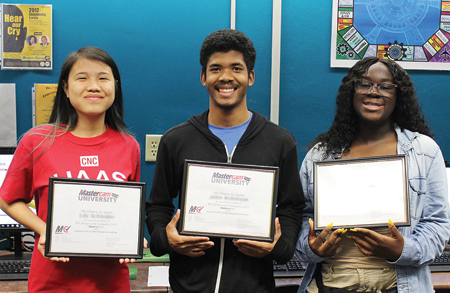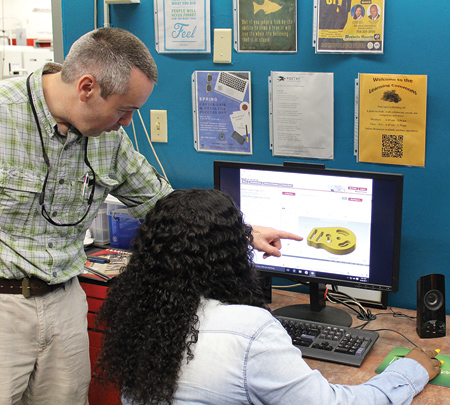
ATC students Lily, Jalen and Bolatito display their Mastercam Associates certificates.

ATC Machining Technologies Instructor Kevin Finan reviews a Mastercam assignment with student Bolatito.
A unique aspect of Atlantic Technical College is that its Coconut Creek, FL, campus also houses a Magnet High School. Known in the community as ATC, Atlantic Technical College and Technical High School is spread out on 30 landscaped acres and features more than 20 buildings housing classrooms, labs, offices and support services. The combined facilities are using the teaching of computer-assisted design (CAD) and computer-assisted manufacturing (CAM) to propel interested students toward rewarding careers in today's world of factory automation. Kevin Finan, Instructor in the Machining Technologies Program, brings more than 25 years of practical experience to the school, having worked in automated manufacturing plants in both Europe and America.
"I have classroom and shop facilities for up to 12 juniors and 12 seniors in the high school and another 12 students in the college-level course," said Finan. "The high school classes are always full, but attendance in the college program depends on the economy. In good times, enrollment is down, but in poor economic times enrollment is up as adults take advantage of the program to improve their skills in order to make themselves more attractive to the area's diverse manufacturing businesses. The high school students and the adult students must complete the same comprehensive program. The Technical College students also earn six or more credits applicable toward an A.S. degree in either Engineering Technology or Industrial Management at Broward Community College."
One of the aspects of ATC that attracted Finan was the well-equipped machine shop that adjoined the classroom facilities, complete with manual mills and lathes, drill presses, surface grinders, hand tools and measuring devices. Once on board, he began requisitioning the latest in automated equipment and received a Haas CNC machining center. Soon after, a Haas CNC lathe was added, along with state-of-the-art CAD/CAM software. "We use SolidWorks for the CAD portion of the program and we have Mastercam for the CAM portion," said Finan. "These are the two most prevalent systems in the marketplace and the ones our graduates will most likely encounter in the real world. In addition to our 25 seats of Mastercam, we also purchased Mastercam U for the students after talking about our program with Dan Newby, our contact at Mastercam. Each student now gets Mastercam U, which is specifically designed to teach Mastercam in an easy, step-by-step procedure through video tutorials right on their computer screen. The students will watch the video lesson, stop, test their ability, go back and re-watch the video, stop and then do it in Mastercam proper. If they are still not sure they have it, they can do it again at their own pace-it could not be easier."
Before getting into CNC machining, all students must first learn the rules of safety. Then, they are introduced to writing G- and M-codes for CNC programming. "I will not introduce Mastercam to the student before he or she knows how important a schedule is," said Finan. "I give them plenty of time for each project assignment and let them know that, if it is a day late, they will get a zero. I tell them that in industry, if parts are not delivered on time to a customer, there will be a big fine that can cost thousands of dollars a day for each day that delivery is late."
Once he feels the students are comfortable with the basics, he has them do their drawing in SolidWorks and then moves on to Mastercam. "What Mastercam does," said Finan, "is create the toolpaths from a student's drawing, which is a wonderful and powerful program, but the student should really have an understanding of what the codes are all about that the program is performing. At this point, I will introduce them to Mastercam U. What Mastercam U does first is bring them up to the interface, such as what does this button do, what about that button, what is Design, what is Setting up Machine Parameters, what is Tool Path and so on. Then, it teaches them how to create toolpaths for a series of practice parts from simple to those that are a little more complex. What is incredibly important for me is the support I receive up in Gig Harbor. A teacher's day is filled from beginning to end and, if a problem arises, that problem can become a major headache without some sort of lifeline. A call to Mastercam is always answered and someone there will spend however long it takes to solve the problem and keep the class moving forward."
Each Mastercam U video practice part module is no longer than a couple of minutes. "This is where the students use a dual screen on their computer so the video lesson will be on the left and Mastercam proper will be on the right. They can go back and forth between the two until they are comfortable with the lesson," said Finan. "They can even work on the Mastercam U lessons at home, on their laptops and even their cell phones. This is especially convenient for the high school students, since they are comfortable using their cell phones for everything."
The school also purchased several Haas CNC simulators for the students. "We cannot buy an expensive CNC machine tool for each student," he said, "but with the affordable simulators, they can transfer the toolpath programs back and forth before they have a turn on an actual machine. Between the Haas CNC simulator and the toolpath simulation with the Mastercam program, students become very well versed in the aspects of automated manufacturing."
Mastercam U provides modules for programming a dozen different parts, but Finan also encourages his students to create their own parts to keep their interest level high. "I had one young lady in the class who noticed a broken lock in the ladies' bathroom," he said. "She asked if she could fix it as a project. I told her `of course,' and had her take a picture of it, along with pertinent dimensions. Using pieces of aluminum, she designed and machined a new part for the lock that worked perfectly. We sent a photo of the new lock to the administration along with an invoice requesting payment, joking of course, but the young lady's eyes were opened to the possibilities her new skills presented. One student made a uniquely designed gearshift knob for his car, and another produced a mounting device for stabilizing a camera. The students begin to see that everything in their homes, in stores, on television and in the world around them is manufactured, and what they are learning comprise the basics for producing life's tangibles."
According to Finan, many people graduating with mechanical engineering degrees from colleges and universities today understand engineering, but most lack an understanding of the steps needed to bring a product from design to manufactured reality. "They do not understand the difference between a drill and a reamer," he said. It is not the engineers' fault, they are very intelligent men and women, but they are rarely exposed to actual machining in college. I feel it is important for them to understand how a programmer and machinist will proceed with their part designs. It will result in better-engineered parts if one can work hand-in-glove with the other."
During the past few years, all of Finan's high school seniors and most of his tech college adults have been awarded Mastercam U Associates Certificates, attesting to their newly acquired skills in CAD/CAM programming. The tech students have also earned six college credits. "While many of our graduates are going on to two- and four-year colleges, the rest are being recruited into well-paying jobs in local and regional industry," said Finan. "These men and women are embarking on a pretty exciting career path, one that I have found even more exciting with each technological advancement in automated manufacturing."
For more information contact:
Atlantic Technical College
4700 Coconut Creek Pkwy.
Coconut Creek, FL 33063
754-321-5100
www.atlantictechnicalcollege.edu
CNC Software, Inc.
671 Old Post Road
Tolland, CT 06084
800-228-2877
info@mastercam.com
www.mastercam.com